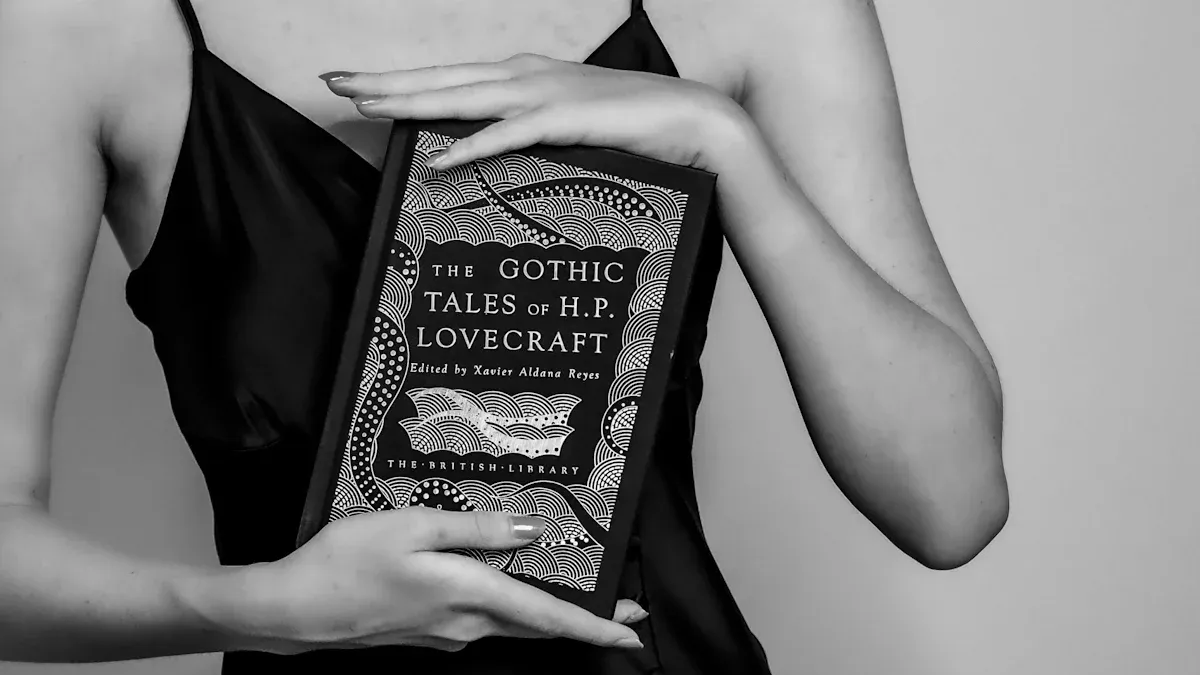I’ll be honest—Confessions of a Grammar Queen by Eliza Knight gave me that cozy, late-night reading buzz. If you love strong women shaking up the 1960s New York publishing scene, this book hits the spot. Fans of “Lessons in Chemistry” or “Mad Men” will find the blend of ambition, friendship, and humor irresistible.
Key Takeaways
Confessions of a Grammar Queen shows an exciting view of 1960s New York publishing. The main character is strong and easy to relate to. She faces unfair treatment at work and tries to reach her goals.
The book mixes smart conversations, true friendships, and funny moments. This makes the story honest and fun. It tells about women who work hard to succeed.
Eliza Knight writes in a clear and bold way. The setting feels real and colorful. This book is great for people who like old office stories and tales about strong women.
Confessions of a Grammar Queen by Eliza Knight
First Impressions
I started Confessions of a Grammar Queen by Eliza Knight late one night, thinking I’d just read a chapter. That plan failed fast. The first pages pulled me in with sharp dialogue and a main character who felt real. I could almost hear the clack of typewriters and smell the coffee in those old publishing offices. Here’s what stood out to me right away:
Bernadette’s first action set the pace. She storms into her boss’s office, not afraid to speak her mind.
The first conversation between Bernadette and her rival made me grin. Their banter had bite and set up the tension.
The opening lines gave the story a witty, confident tone. I knew I’d get sass and smarts.
The first challenge Bernadette faces—being dismissed by her male coworkers—made me root for her.
The setting felt alive. The author painted 1960s New York with just a few words.
I have to give props to Eliza Knight for making me care about Bernadette so quickly. The story’s style felt punchy and honest, not too heavy but never shallow.
Who Should Read It
If you love stories about women breaking barriers, Confessions of a Grammar Queen by Eliza Knight will speak to you. I’d recommend it to:
Fans of “Lessons in Chemistry” who want another smart, determined heroine.
Anyone who enjoys office drama with a retro twist.
Readers who like friendship, ambition, and a little bit of snark.
People who want a feel-good read that still tackles real issues.
Tip: This book works great for book clubs. There’s plenty to discuss, from workplace feminism to the power of female friendship.
I’d rate it a solid 7/10. It didn’t leave me gasping, but I couldn’t put it down either.
Synopsis
Setting and Era
New York City in the 1960s feels like a character itself in Confessions of a Grammar Queen by Eliza Knight. I could almost hear the city’s buzz through the pages. The story drops you right into the heart of the publishing world, where typewriters clack and coffee flows nonstop.
Offices fill with cigarette smoke and ambition. I love how the book shows the old-school publishing scene—no computers, just stacks of paper and red pens everywhere.
The city feels alive, but also tough.
The publishing office has strict rules, but people break them all the time.
Women wear pencil skirts and fight for respect.
Every street corner seems to hold a new challenge for Bernadette.
Note: If you enjoy stories set in a time before smartphones, you’ll love this throwback vibe.
Main Character: Bernadette Swift
Bernadette Swift stands out right away. She’s smart, stubborn, and not afraid to speak up. I found myself rooting for her from the first page. She wants to become the first female CEO in publishing, which feels impossible in her world. Still, she keeps pushing.
Bernadette loves grammar and words.
She faces rude coworkers but never backs down.
Her friendships with other women give her strength.
She makes mistakes, but she learns from them.
I saw parts of myself in Bernadette. She’s not perfect, but she’s real. That’s what kept me turning the pages.
Themes

Ambition and Glass Ceiling
Bernadette’s ambition jumps off every page. She wants to be the first female CEO in publishing, and I felt her drive in every scene. The book doesn’t sugarcoat how hard it is for her. Men in her office doubt her, ignore her ideas, or take credit for her work. I saw her frustration, but I also saw her grit. She keeps showing up, even when the odds feel stacked against her.
Bernadette’s story reminded me of real research. Sherryl Stalinski’s study talks about how women face barriers at work, even when they work just as hard as men. The “glass ceiling” isn’t just a phrase—it’s a real thing that blocks women from top jobs.
Kate Jones’ book shares stories of women who push past these limits. It shows that ambition is not the problem. The problem is the system that tries to hold women back.
I cheered for Bernadette every time she stood up for herself. Her journey felt honest, not perfect. She messes up, but she keeps going. That’s what made her ambition so real to me.
Feminism
The 1960s setting shapes everything in Confessions of a Grammar Queen by Eliza Knight. The book shows a world where men run the show and women have to fight for every scrap of respect. I saw how Bernadette and her friends deal with jokes, unfair rules, and double standards. Sometimes, it made me angry. Other times, I just wanted to hug them.
Feminist ideas started to grow in the 1960s. Writers and critics began to call out how stories and workplaces treated women. They talked about patriarchy, and the ways women got pushed aside.
I learned that even music from the 1960s had a lot of messages. A big study looked at thousands of songs and found that feminism was common in the lyrics. That tells me the book’s world wasn’t just fiction. It was real life for many women.
The book doesn’t preach. It just shows what Bernadette faces and lets me feel her struggle. I liked that. It made the story feel honest and true to its time.
Friendship and Support
Bernadette’s friendships are the heart of the story. She leans on her friends when work gets tough. They listen, give advice, and sometimes call her out when she needs it. I loved these moments. They felt real, not forced.
Studies show that good friends help us talk about our problems and make sense of our lives. Friends give us a safe place to share secrets and dreams.
High-quality friendships can even help us feel better when we’re sad or stressed. They give us confidence to try new things and bounce back from setbacks.
I noticed that when Bernadette struggled, her friends helped her see things in a new way. Their support made her stronger and braver.
I think the book gets friendship right. It’s not just about gossip or fun. It’s about having people who stand by you, even when things get messy.
Eliza Knight
Author Background
I always get curious about the person behind a book, so I looked up Eliza Knight. She’s not just any writer—she’s an award-winning, USA Today and international bestselling author. Her love for history started when she was a kid.
Trips to Versailles and historical reenactments near Washington, D.C. sparked her imagination. I can see how those early adventures shaped her stories.
She’s super active in the writing world. Eliza runs a blog called History Undressed and co-hosts the History, Books and Wine podcast. I checked out a few episodes, and she sounds just as passionate about books as she does about history.
She’s also part of groups like the Historical Novel Society and Novelists, Inc. I didn’t find any big interviews or biographies, but her official website and social media give a peek into her family life and hobbies. She seems like someone who truly loves what she does.
Note: If you enjoy learning about authors’ lives, her blog and podcast are fun places to start.
Writing Style
Eliza Knight’s writing feels like a chat with a clever friend. She uses snappy dialogue and keeps the story moving. I noticed she doesn’t waste words. Every scene has a purpose. Her descriptions of 1960s New York made me feel like I was right there, hearing the typewriters and smelling the coffee.
Short chapters kept me turning pages.
She mixes humor with real emotion.
The characters talk like real people, not like they’re reading from a script.
I never felt lost or bored. Her style made the book easy to read, but it still had depth. If you like stories that feel honest and lively, you’ll probably enjoy her voice as much as I did.
Strengths
Publishing World Depiction
I loved how Eliza Knight painted the 1960s publishing scene. The details felt spot-on. I could almost hear the typewriters and see the stacks of paper everywhere. The office rules felt strict, but people still found ways to break them. I noticed the book didn’t shy away from showing the tough parts, like how women had to fight for every bit of respect.
The story reminded me of other books set in publishing, but this one felt more honest about the struggles.
I saw how the book fit into a bigger picture. Earlier stories often showed only one side, sometimes with stereotypes. This book gave a fuller view, showing both the progress and the problems.
The author didn’t just focus on the main character. She showed how the whole office worked, from the bosses to the assistants.
Here’s a quick look at what reviewers and critics say makes a book’s setting strong:
Evaluative Aspect | Example of Strengths Assessed |
|---|---|
Content Coverage | No big gaps, covers all the important stuff |
Organization/Layout | Easy to follow, clear chapters |
Overall Quality | Feels real, easy to read, not confusing |
Character Appeal
Bernadette Swift jumped off the page for me. She’s smart, stubborn, and funny. I rooted for her from the start. Her friends felt real too. They argued, laughed, and helped each other out. I liked that nobody was perfect. Everyone had flaws, but that made them more interesting.
The author’s purpose came through. She wanted to show a woman fighting for her place, and she did it well.
The book worked for its intended audience. I think anyone who likes stories about strong women or office drama will enjoy it.
The arguments and themes felt real. I believed in Bernadette’s struggles and dreams.
If you want a story with heart and humor, these characters deliver.
Critiques
Areas for Improvement
There were many things I liked about this book, but some parts bothered me. I wanted more detail in certain places. The story moved quickly, so I missed some small moments. I hoped to learn more about Bernadette’s thoughts, not just her actions at work.
Some side characters did not feel unique. I sometimes mixed up their names because they seemed too similar.
A few scenes ended too fast. I wanted more drama or consequences after big fights.
The dialogue was fun, but the story sometimes felt rushed. I needed a pause between exciting parts.
Comparison
Lessons in Chemistry
I kept thinking about “Lessons in Chemistry” as I read this book. Both stories give us a smart, bold woman fighting for respect in a world run by men. The settings feel different—one is science, the other is publishing—but the struggles hit the same nerve. I saw Bernadette and Elizabeth Zott both push against the glass ceiling, never letting the system break them.
Strong female leads: Both books center on women who refuse to play by the old rules.
Workplace drama: Each story shows how tough it is to get ahead when people doubt you.
Friendship and support: The main characters lean on friends to survive the daily grind.
Witty tone: I laughed out loud at the sharp comebacks and clever lines.
Industry reviews often compare these books by looking at their style, tone, and what they promise readers. Reviewers say both books fill a gap for readers who want more stories about women breaking barriers. I agree. If you liked the mix of humor and heart in “Lessons in Chemistry,” you’ll probably enjoy this one too.
Mad Men Vibes
This book gave me serious “Mad Men” vibes. The 1960s New York office, the sharp suits, the smoky rooms—it all felt familiar. The story pulls you into a world that looks glamorous but hides a lot of problems.
Design and mood: The book paints a picture of an exclusive, stylish office life, just like “Mad Men.”
Cool, distant tone: Sometimes the story feels emotionally cool, making me watch the drama from a safe distance.
Complex characters: The men in the story get mocked and admired at the same time, which kept me guessing how I felt about them.
Social critique: The book lets me feel smarter than the old-fashioned world it shows, but I still wanted to keep reading.
Reviewers point out that both “Mad Men” and this book balance charm with a sharp look at feminism. I noticed the same thing. The story invites you in, but it never lets you forget how hard it was for women to get ahead.
Confessions of a Grammar Queen by Eliza Knight gave me sharp characters, real friendships, and a punchy look at 1960s publishing.
Some scenes felt rushed, but I still rooted for Bernadette.
If you love strong women and retro office drama, grab this book!
Sip The Unknown—Discover Stories You Never Knew You’d Love!
Dionysus Reviews Has A Book For Every Mood
Biography & Memoir
Fiction
Mystery & Detective
Nonfiction
Philosophy
Psychology
Romance
Science Fiction & Fantasy
Teens & Young Adult
Thriller & Suspense
Frequently Asked Questions
Is “Confessions of a Grammar Queen” a good pick for book clubs?
Yes! The story sparks real talk about ambition, friendship, and feminism. I found plenty to discuss with my own group.
Does the book have any romance?
There’s a hint of romance, but it never takes over.
The focus stays on Bernadette’s career and friendships.
Will I like this if I loved “Lessons in Chemistry”?
I think so! Both books feature smart, bold women fighting for respect. If you want more retro office drama, you’ll enjoy this one.









